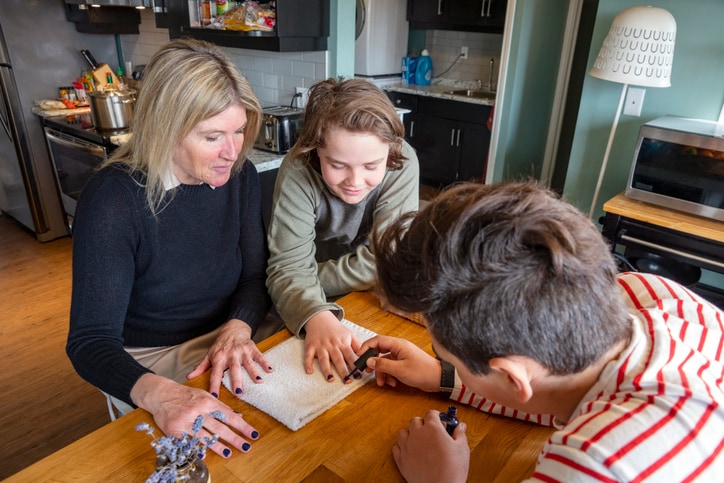Ever since your baby was born, you’ve wondered what goes through her head. Between the ages of 3 and 4, she’s finally developing her speech enough to tell you what she’s thinking. Language development in children of this age revolves largely around talking more clearly, learning to speak in correct sentences and expanding their vocabulary.
As your little one explores more and more of her world, she’s encountering new ideas and objects that she can talk about later. “Language connects to cognition,” says Amy Carlton, a pediatric speech-language pathologist at Treehouse Pediatric Therapy. “Your child has to learn a concept first and understand it before she uses that concept in her expressive language.” Here’s what you can expect during this age.
And read
our guide to developmental milestones for kids
.
Speech Success
Between the ages of 3 and 4, your child’s vocabulary will start to expand. According to the American Academy of Pediatrics, she will start to follow basic grammar rules, such as using articles (“a” and “the”) and pronouns (such as “I,” “you,” “he” and “she”). At the start of this year, your child should use three- to four-word sentences, but by her fourth birthday, she’ll begin to speak in longer sentences as she learns to use more descriptive language. You won’t just hear about the kitty she saw — you’ll hear about the huge yellow cat with stripes down the street. As the U.S. National Library of Medicine notes, your little one will grow her vocabulary to several hundred words during this year. She’ll use this knowledge to tell you something that happened at school that day, share information with you about an event she experienced or tell a story — real or make-believe — to you.
As your child learns more words, she’ll also refine her pronunciation and become easier to understand. Dr. Uday Mehta, chief of developmental and behavioral pediatrics at Children’s Specialized Hospital, suggests a simple “rule of four” to evaluate your child’s progress: one fourth of the words spoken in your child’s first year should be understandable to a stranger, half of the words should be understood by age 2, three quarters by age 3 and all words by age 4. Of course, not all children develop equally, but the rate remains a good guide to see if your child has any articulation issues.
How to Help
Carlton offers some great tips for parents who want to help their child’s language development. “I’m a real advocate for spending time reading with your child,” says Carlton. “Don’t underestimate the power of book time.” A lot of language develops through reading, where you can work on language skills (such as using correct pronouns, constructing sentences and articulation) as you read to them. Spending 20 minutes a day reading together can make a big difference for your child’s speech.
You should also incorporate as many senses into the learning process as possible, recommends Carlton, since a child can learn language through more than just listening. One method she suggests is providing visual cues for your child. When working on expanding a phrase or sentence length, you can provide a visual hand sign that represents a word or sound that you want to encourage your child to use.
Carlton gives this example: “If your child is having a hard time producing the ‘t’ sound at the end of ‘hat,’ you can say, ‘I make my tongue go up for that sound’ and then tap above your upper lip while you model the ‘t’ sound.” Next time your child trips over that sound, tap above your lip as a reminder. Providing an encouraging and supportive learning environment at home will not only be beneficial to your child’s language skills but will also give her confidence.
Remember that language development in children is a complex process. Be patient with your toddler, talk to her often and enjoy her newfound communication skills. Mehta advises to avoid jumping to conclusions if you are concerned about your preschooler’s language development: “Remember that there are individual variations among siblings and families, and there are multiple factors that determine language development, including genetics and environment. If you have any concerns about your children’s speech development, trust your instinct and give your pediatrician a call.”
Make sure to check out our
Overview of Milestones for 3 Year Olds
.
Clarissa Harper is a freelance writer, a wife and a mother to three wonderful boys. When she is not writing or caring for her family, she can be found at the local craft store looking for her next creative project.
* This article is for general informational purposes only. It is not intended nor implied to be providing medical advice and is not a substitute for such advice. The reader should always consult a health care provider concerning any medical condition or treatment plan. Neither Care.com nor the author assumes any responsibility or liability with respect to use of any information contained herein.






